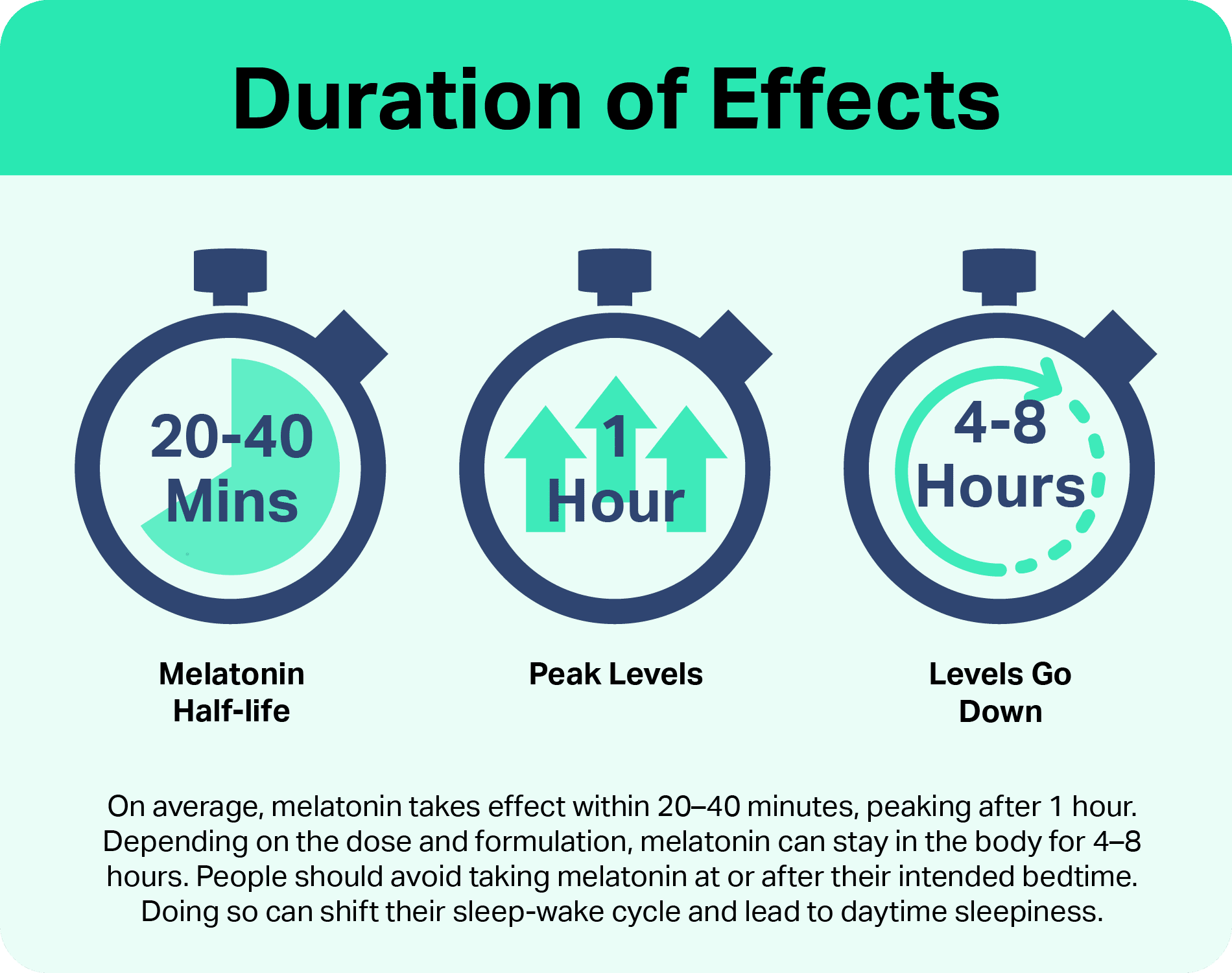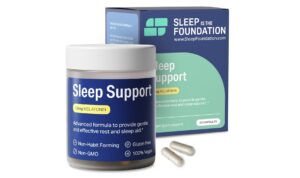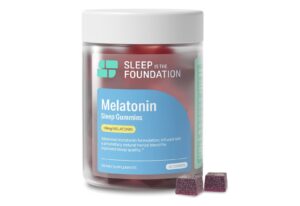Do Melatonin Sleep Patches Help You Fall Asleep?
Melatonin is a hormone that makes you feel sleepy. Your body produces it naturally, but you can also purchase melatonin supplements. In fact, melatonin is one of the most popular sleep aids you can buy over the counter , and it appears to cause fewer side effects than pharmaceutical sleep medications.
Melatonin supplements exist in many formats, including pills, tablets, gummies, liquids, lozenges, sublingual melts, sprays, and transdermal patches.
How Do Melatonin Patches Work?
Melatonin patches are transdermal patches, with an adhesive backing that allows them to be applied directly to the skin . As you sleep, the patch delivers melatonin to your body.
Once it is applied to your skin, the patch releases melatonin into your body through the dermis, or skin. Unlike most melatonin supplements, which deliver the melatonin quickly to help you fall asleep faster, melatonin patches are formulated with an extended-release system designed to help you stay asleep longer.
Specific instructions may vary based on the particular melatonin patch you select, but typically, the process includes applying the patch an hour before bedtime. Some brands recommend choosing an area that is comfortable and as hair-free as possible, such as your forearm, shoulder, calf, or the top of your foot. Go to sleep with the patch on, and remove it in the morning. Any adhesive that remains once the patch is removed can be cleaned off with soap and water.
Melatonin patches are designed for one-time use and usually come in sets with multiple patches.
Get to the root of your sleep problems
Melatonin can help, but it’s best to find the source of your sleep issues. Answer these questions to better understand your sleep.
What Does Melatonin Do?
Melatonin plays a key role in regulating your sleep-wake cycle. The body decreases melatonin production during exposure to light and releases more melatonin when it is dark. Ideally, your brain would use sunlight as its only cue, and ramp up melatonin production after sunset. With the prevalence of smartphones and outside lights, however, people are exposed to artificial light that deceives the brain into thinking it is still daytime. Depending on the level of your exposure to artificial light, your brain may delay melatonin production, and consequently, your sleep.
Around 1 in 3 people do not get enough sleep on a regular basis. Sleep deprivation affects all aspects of your well-being : physical, emotional, and mental. Melatonin supplements may improve sleep for some people by compensating for low levels of melatonin in the body.
The safety and efficacy of supplements is not closely monitored by the U.S. Food and Drug Administration (FDA). Shoppers should take additional measures to make sure they are purchasing reputable products.
Do Melatonin Patches Actually Help You Fall Asleep?
Because melatonin patches are newer than other types of melatonin supplements, few studies have examined how well they work.
One study found that melatonin sleep patches are effective in helping people maintain sleep, even during the daytime. This may make melatonin patches a good fit for people who perform shift work or experience jet lag. By reducing premature awakenings, the patches allowed participants to spend more time in stage 2 sleep and rapid eye movement (REM) sleep, the stages of sleep that shift workers tend to miss out on most. Based on these results, the researchers reasoned that melatonin patches might also be helpful for older adults, who naturally have lower melatonin levels and often wake up earlier than they would like.
While research into sleep patches is still new, much more research has been done showing the effectiveness of oral melatonin for sleep. Melatonin appears to improve sleep for people with sleep disorders such as delayed sleep phase syndrome or non-24-hour sleep wake disorder. It may also help those with insomnia fall asleep faster, and it appears to alleviate some symptoms of jet lag.

How Do Patches Compare to Other Types of Melatonin?
The effects of melatonin vary based on the dosage and the method of administration. The type of melatonin supplement you take determines its bioavailability, or how much of the active form of the drug makes it into your bloodstream.
For example, when you take melatonin orally, a significant amount is lost through the metabolization process, which is why oral melatonin has lower bioavailability . Melatonin nasal sprays, and patches or sprays that go under the tongue, appear to have the highest bioavailability. Transdermal melatonin falls somewhere in the middle.

Oral melatonin supplements have a short half-life. That means they work quickly and are more effective at helping you fall asleep, but less beneficial in helping you stay asleep. Melatonin patches, on the other hand, work by allowing the melatonin to be absorbed through your skin. The patch continues releasing melatonin for several hours, so it is better suited to helping prevent early awakenings.
Are Melatonin Sleep Patches Safe to Use?
In general, oral melatonin supplements as well as sleep patches are considered likely safe for short-term use. Possible side effects include headaches, dizziness, irritability, temporary depressive feelings, and stomach cramps. Because melatonin also induces sleepiness, you should avoid driving a car or operating heavy machinery while under the effects of supplemental melatonin.
Melatonin may pose additional risks for certain people, including:
- Those who are pregnant, breastfeeding, or trying to become pregnant
- Individuals with a bleeding disorder or high blood pressure
- People living with depression
- People with seizure disorder
- Children
- People who have received a transplant
- Those who are currently taking other medications
As melatonin is classed as a supplement in the United States, it is not regulated by the Food and Drug Administration (FDA). It is best to speak to your doctor before using any type of melatonin, patch or otherwise.
Sometimes, melatonin patches contain other sleep-promoting ingredients in addition to melatonin, such as valerian, L-theanine, or GABA. They may also contain adhesives, or ingredients designed to facilitate the absorption of these sleep aids. When considering a melatonin patch, review all the ingredients with your doctor and ask them if you should expect any side effects, based on your personal medical history or other medications you may be taking. Always read the instructions thoroughly before using melatonin supplements for the first time.
Are Melatonin Patches Right for Me?
You may find melatonin patches useful if you have trouble sleeping through the night, or if you need to sleep during the day. Although more research is needed to understand how melatonin patches differ from other forms of melatonin supplements, studies suggest that the continuous release of melatonin through a transdermal sleep patch can help people stay asleep.
Some people find melatonin patches to be more comfortable than taking an oral supplement or using a nasal spray. Although melatonin supplements are available over the counter, you may want to talk to your doctor before starting to take melatonin. They can help you weigh the benefits and drawbacks of each format to find the right fit for you.
Medical Disclaimer: The content on this page should not be taken as medical advice or used as a recommendation for any specific treatment or medication. Always consult your doctor before taking a new medication or changing your current treatment.
References
9 Sources
-
Savage, R. A., Zafar, N., Yohannan, S., & Miller, J. (2020). Melatonin. In StatPearls. StatPearls Publishing.
https://pubmed.ncbi.nlm.nih.gov/30521244/ -
Costello, R.B., Lentino, C.V., Boyd, C.C., O’Connell, M.L., Crawford, C.C., Sprengel, M.L., & Deuster, P.A. (2014). The effectiveness of melatonin for promoting healthy sleep: A rapid evidence assessment of the literature. Nutrition Journal, 13, 106.
https://pubmed.ncbi.nlm.nih.gov/25380732/ -
Aeschbach, D., Lockyer, B. J., Dijk, D. J., Lockley, S. W., Nuwayser, E. S., Nichols, L. D., & Czeisler, C. A. (2009). Use of transdermal melatonin delivery to improve sleep maintenance during daytime. Clinical Pharmacology and Therapeutics, 86(4), 378–382.
https://pubmed.ncbi.nlm.nih.gov/19606092/ -
Natural Medicine Comprehensive Database. (2021, December 13). Melatonin. Therapeutic Research Center., Retrieved August 12, 2021, from
https://medlineplus.gov/druginfo/natural/940.html -
Gooley, J. J., Chamberlain, K., Smith, K. A., Khalsa, S. B., Rajaratnam, S. M., Van Reen, E., Zeitzer, J. M., Czeisler, C. A., & Lockley, S. W. (2011). Exposure to room light before bedtime suppresses melatonin onset and shortens melatonin duration in humans. The Journal of Clinical Endocrinology and Metabolism, 96(3), E463–E472.
https://pubmed.ncbi.nlm.nih.gov/21193540/ -
Sheehan, C. M., Frochen, S. E., Walsemann, K. M., & Ailshire, J. A. (2019). Are U.S. adults reporting less sleep?: Findings from sleep duration trends in the National Health Interview Survey, 2004-2017. Sleep, 42(2), zsy221.
https://pubmed.ncbi.nlm.nih.gov/30452725/ -
National Heart, Lung, and Blood Institute. (n.d.). Sleep deprivation and deficiency., Retrieved August 12, 2021, from
https://www.nhlbi.nih.gov/health-topics/sleep-deprivation-and-deficiency -
Karasek, M. (2004). Melatonin, human aging, and age-related diseases. Experimental Gerontology, 39(11-12), 1723–1729.
https://pubmed.ncbi.nlm.nih.gov/15582288/ -
Zetner, D., Andersen, L. P., & Rosenberg, J. (2016). Pharmacokinetics of alternative administration routes of melatonin: A systematic review. Drug Research, 66(4), 169–173.
https://pubmed.ncbi.nlm.nih.gov/26514093/

















